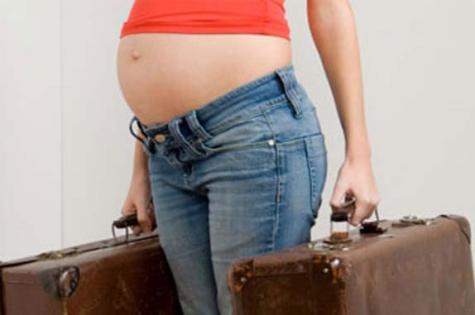It's 2am and I'm staring at the beige ceiling of my floating hotel room. My only thoughts are of escape.
I'm trapped in a shrunken bedroom, on a small ship on a seemingly endless river - the Main, which divides Germany's north and south.
It's the third night of a one-week river cruise through the heart of Europe, where we're supposed to be visiting Christmas markets and churches - and having a "fabulous once-in-a-lifetime adventure", the brochure says.
Rewind six months.
My partner and I are discussing a European holiday. We decide to take a cruise from Prague to Frankfurt and then catch a train to Amsterdam to spend Christmas with his relatives.
Then one week before departure we're surprised to discover I'm pregnant. We don't for a minute think of cancelling the trip - there's no way I'm going to skip a European holiday because I'm now with-child.
But from the moment I stepped on that Virgin Atlantic plane at Sydney airport the trouble started.
As soon as the seatbelt sign flicked off I jumped up to go to the toilet, but en route I became dizzy and had to lie down on the floor.
I was quickly discovered by a crew member who pulled me into the galley, lifted my legs (to return the blood to my brain as fast as possible) and made me breathe in from an oxygen tank.
Slowly, I came back to life.
When I could speak I explained that I was pregnant and hadn't eaten for several hours. Suddenly a feast appeared: crisps, bananas, a chocolate bar.
To my delight when we arrived in Hong Kong I was placed in a wheelchair, given another banana and whizzed off the plane first and helped through security to my next flight.
It was like flying first class without the price tag. But where was the champagne?
Many bananas later and finally I arrived at London Heathrow, where we had to board another flight to get to Prague.
Thus here I am staring at the ceiling experiencing how pregnancy can make you: sensitive to motion sickness, insatiably hungry for ice-cream, so fatigued that you feel like you're coming down with the flu and yet so wide awake in the night that you could run a marathon.
It's now 4am. My partner is still sleeping. And room service still won't pick up.
I peek through the curtains covering the floor-to-ceiling window. I can't see any fairytale castles, chocolate-box villages or snowy woodlands, just a large shipyard containing cranes, slipways and warehouses.
By 6am, we're cruising into Miltenberg - a ridiculously picturesque village. In the townsquare, village folk would be setting up their Christmas stalls, preparing to sell giant German sausages snuggled in fresh buns, warm chestnuts in brown-paper flutes and hot mulled wine.
Meanwhile, on our little boat the waiters, no doubt, are putting out croissants, cutting up fruit, flipping the pancakes and putting out the ice-cream.
Ah, I start to feel drowsy.
I pull up the duvet, roll on to my side and start to drift off to sleep.
This is where I'll stay, exhausted I'm sure, for the remainder of the day.
Miltenberg - like Wurzburg and Bamberg - will not be seen on this trip.
If friends and family ask me what these villages were like when I return I won't have any photos to share.
But I'll keep the brochure to show everyone.
The brochure that says on the front cover: "European river cruising - an experience you'll never forget."
ADVICE FOR THOSE CONSIDERING TRAVELLING WHILE PREGNANT:
- When to travel? The second trimester of a pregnancy is the safest time to travel. This is also when morning sickness has usually subsided.
- Where to travel? Take into consideration the standard of medical care at your chosen destination just in case you need help.
- Medications and pre-travel immunisations? Some are fine and some aren't. Check with a doctor who is expert in travel medicine.
- Malaria. Pregnant women are twice as likely as their non-pregnant counterparts to be bitten by mosquitoes due to more heat production and increased release of volatile substances from the skin surface. While some preventative drugs are fine for pregnant women to take, others are not.
- Flying. A pregnant woman has a slightly increased risk of deep vein thrombosis (DVT). Book an aisle seat, go for walks on the aircraft and wear compression stockings.
- Qantas and Virgin Australia. After 28 weeks, you need to carry a letter from a medical practitioner or midwife confirming the estimated date of delivery; whether it is a single or multiple pregnancy; and that there are no complications with the pregnancy. Check the airlines' websites for more information.
- Insurance. Travel insurance will usually not cover pregnancy-related problems in the third trimester of pregnancy.

















__small.png)










